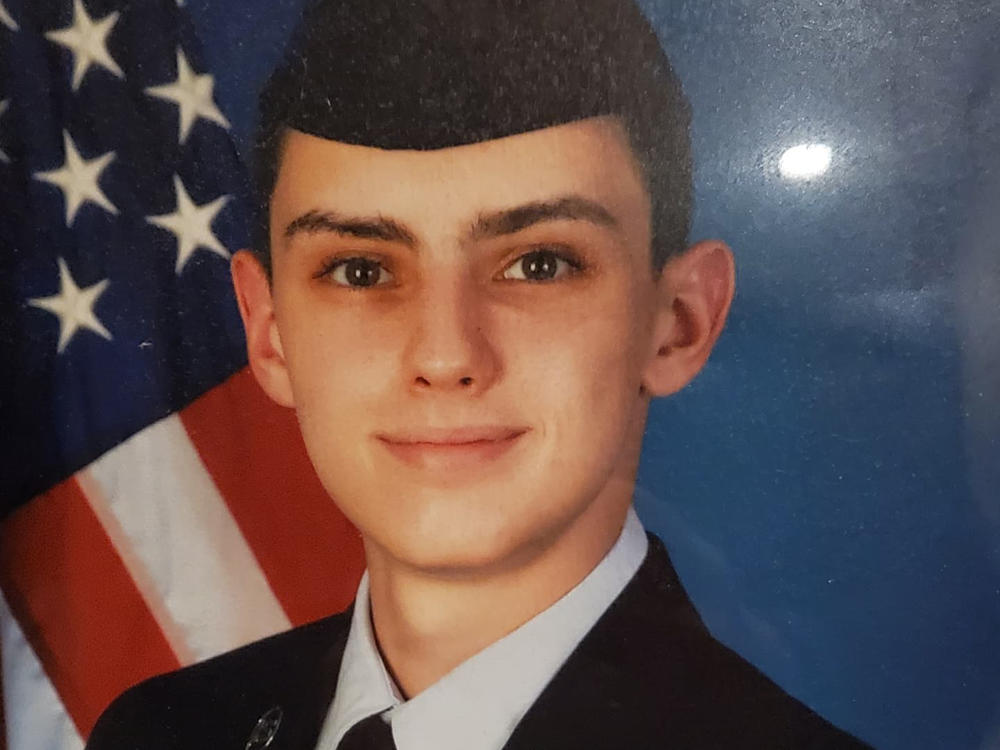Section Branding
Header Content
The Air National Guard disciplines 15 members in wake of Discord intel leak
Primary Content
In the summer of 2022, Airman 1st Class Jack Teixeira, just 20 and working as a cyber apprentice for an Air Intelligence Wing at base on Cape Cod, was seen viewing some of the government's most secret information: details about U.S. spy satellites, phone intercepts of Russian generals, North Korean drones.
A month later, he again was not only reading it but scribbling something on a Post-It note. On at least four occasions, lasting into January of 2023, Teixeira continued what Air Force investigators in a newly released report call "questionable activity."
Some of his supervisors knew he should not have had access to the information and told him to shred his notes but failed to alert proper authorities, the Air Force report said, "fearing security officials might 'overreact.' "
Teixeira ended up posting hundreds of classified documents online to the chat group Discord. In messages, Teixeira boasted about what he had seen.
"This information I give here is less than half of what's available. All of this s*** I've told you guys I'm not suppose to," he said on one of the forums, according to the Justice Department's filing. Air Force investigators said Teixeira started posting information as early as February of this year and included rewritten paragraphs of text and photographs of documents. Investigators said he was concerned about taking notes in a classified work center at the base and instead brought documents home to photograph and post online.
Teixeira was arrested by FBI agents in April at his home in North Dighton, Mass. He faces a number of charges relating to the unlawful release of classified information and could receive up to 60 years in jail. He has pleaded not guilty.
Now the Air National Guard has taken action against 15 service members, ranging from sergeants to colonels, for dereliction of duties for not stopping Teixeira's alleged activity. Some were fired, others received administrative punishment. Col. Sean Riley, who headed the 102nd Intelligence Wing at Otis Air National Guard Base on Cape Cod, was relieved of command. The Guard said it also suspended other commanders and said the 102nd Intelligence, Surveillance and Reconnaissance Group was "taken off mission" when Teixeira was discovered as the source of the unauthorized disclosures.
"The group's mission remains reassigned to other organizations within the Air Force," said an Air Force press release.
A damning picture
The Air Force Inspector General's report paints a damning picture of inaction by officials in Teixeira's unit, who were repeatedly aware of what he was doing.
"Had any of these members come forward, security officials would likely have facilitated restricting systems/facility access and alerted the appropriate authorities, reducing the length and depth of the unauthorized and unlawful disclosures by several months," it reads.
The Air Force report also said the 102nd Wing's commanders "were not vigilant in inspecting the conduct of all persons who were placed under their command," adding they "prioritized immediate mission requirements, such as processing personnel clearances and granting access ..."
In a statement, Air Force Secretary Frank Kendall said: "Our national security demands leaders at every level protect critical assets, ensuring they do not fall into the hands of those who would do the United States or our allies harm."
The 102nd Wing says on its website its mission is to "provide worldwide precision intelligence and command and control along with trained and experienced Airmen for expeditionary combat support and homeland security." A unit at the base also processes intelligence from spy planes and drones and supports the National Geospatial-Intelligence Agency, one of the most secretive intelligence agencies which runs spy satellites.
Unanswered questions
Some questions are left unanswered in the Air Force inspectors general's report and will likely be raised by members of Congress when they are briefed on the matter.
One key question is how did he receive among the highest clearances, Top Secret-Sensitive Compartmented Information.
Teixeira was suspended from high school for a few days in 2018 over incendiary remarks he allegedly made. Classmates overheard him talking about Molotov cocktails, guns at school and racial threats, according to federal court filings filed to keep Teixeira in custody before trial, though Teixeira's public defender said the incident was thoroughly investigated and he returned to school after a psychiatric evaluation.
Still, the incident led Dighton police to deny Teixeira a gun permit in 2018 due to their concerns about the high school incident. He joined the Air Guard the following year, and was granted a gun permit in 2020.
In the Air Force report, investigators said all those with a security clearance require a background check. But "details learned in the background check are not routinely shared with a member's unit."
During Teixeira's background investigation "some negative information was discovered," but it was determined that the " 'whole person' concept and federal guidelines" were used and he received the Top Secret-Sensitive Compartmented Information clearance. Still, the report said the information about Teixeira could have led to "enhanced monitoring," and had his unit been made aware of concerns, "they may have acted more quickly after identifying additional insider threat indicators."
Copyright 2023 NPR. To see more, visit https://www.npr.org.

